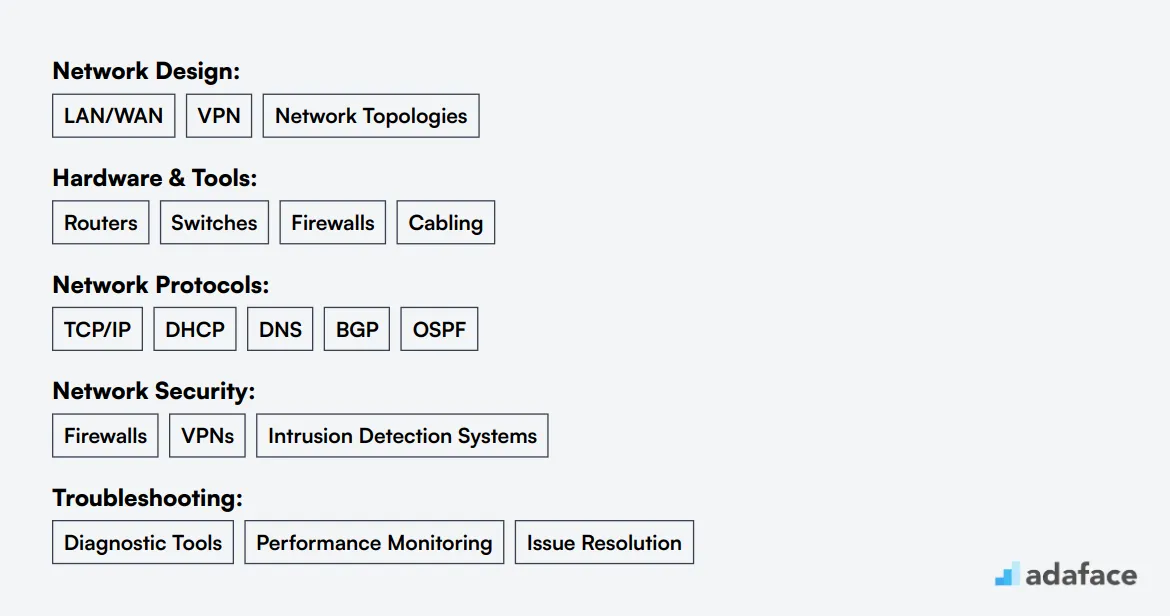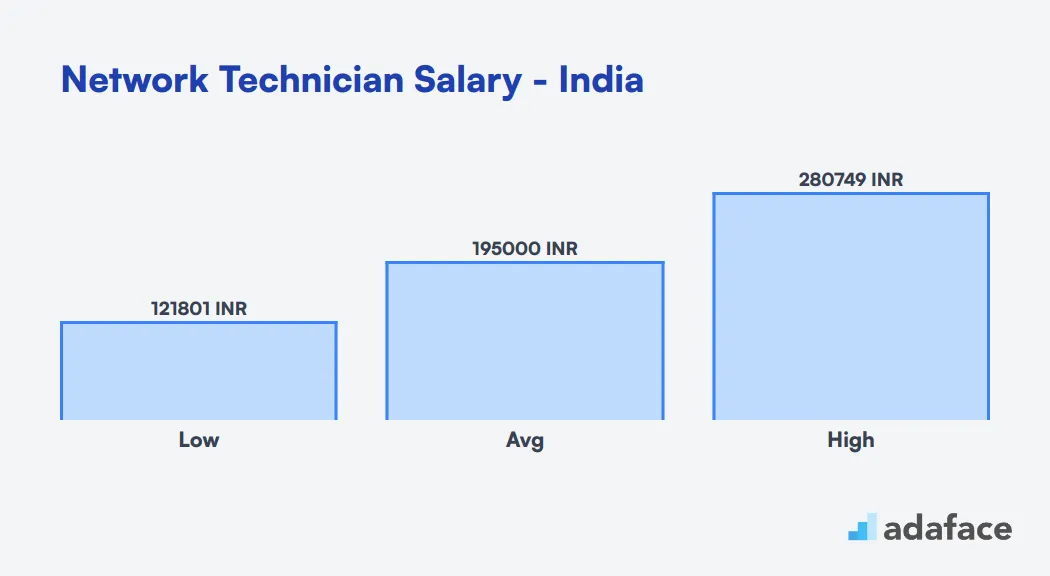Hiring the right network technician can make or break your IT infrastructure. As a recruiter, you're tasked with finding candidates who not only have the technical skills but also fit seamlessly into your organization's culture. Many companies struggle to identify applicants who can balance theoretical knowledge with practical experience, often overlooking soft skills that are crucial for success in this role.
This comprehensive guide will walk you through the process of hiring top-notch network technicians. We'll cover everything from crafting an effective job description to conducting technical interviews. For a deeper dive into the specific skills required for this role, check out our detailed breakdown of network technician skills.
Table of contents
Essential Skills and Qualifications for a Network Technician
When hiring a Network Technician, defining the ideal candidate profile is critical. It’s common for recruiters to mix up what is required versus what is merely preferred, which can lead to missed opportunities. For example, while experience with specific networking protocols may be essential, familiarity with other tools might only be a nice-to-have.
To assist you in identifying the right candidate, here’s a breakdown of the required and preferred skills and qualifications you should consider:
| Required skills and qualifications | Preferred skills and qualifications |
|---|---|
| Associate degree in Computer Science, Information Technology, or related field | Bachelor's degree in Computer Science, Information Technology, or related field |
| Two or more years of experience as a network technician or in a similar role | Certifications such as CompTIA Network+, Cisco CCNA, or equivalent |
| Hands-on experience with network hardware and cabling | Experience with wireless networking technologies |
| Proficiency in network equipment and tools such as routers, switches, and firewalls | Familiarity with network security practices and tools |
| Knowledge of networking protocols and standards (e.g., TCP/IP, DHCP, DNS) | Demonstrated ability to troubleshoot and resolve network issues quickly |
How to Write an Effective Network Technician Job Description
Once you've defined the ideal candidate profile, the next step is crafting a compelling job description to attract top network technicians. Here are some quick tips to help you create a standout Network Technician job description:
- Highlight key responsibilities and impact: Clearly outline the day-to-day tasks and how they contribute to the company's overall IT infrastructure.
- Balance technical requirements with soft skills: List specific networking certifications and experience, but also emphasize problem-solving and communication abilities.
- Showcase your company's unique selling points: Mention opportunities for professional growth, cutting-edge projects, or a supportive team environment to set your role apart.
- Use clear, concise language: Avoid jargon and focus on presenting information in an easy-to-read format that resonates with potential candidates.
10 Platforms to Hire Network Technicians
Now that you've crafted a job description for a Network Technician, it's time to list the position on various job sites to source the right candidates. Choosing the right platform can greatly impact your hiring process, providing access to a pool of qualified technicians ready to join your team.
Dice
Ideal for finding specialized network technicians. Dice focuses on tech jobs, attracting qualified candidates in the IT field.

Indeed
Suitable for a wide range of network technician roles. Indeed aggregates listings from multiple sources, providing a broad candidate pool.

LinkedIn Jobs
Excellent for finding experienced network technicians. LinkedIn allows you to leverage professional networks and view candidate profiles.

For the remaining platforms, consider Glassdoor to attract candidates who value company culture, and Monster for high-volume hiring needs. Upwork is a fantastic choice for short-term or freelance roles, while Field Engineer focuses on field service technicians. TechFetch offers IT-specific talent, Craigslist is useful for local hiring, and ZipRecruiter uses AI for precise candidate matching. If you're interested in learning more about recruitment strategies, you might find our tech recruitment blog insightful.
Keywords to Look for in Network Technician Resumes
Resume screening helps you quickly filter candidates for Network Technician roles. It's a time-saver that lets you focus on the most promising applicants.

To screen manually, focus on key skills like networking protocols, hardware experience, and troubleshooting abilities. Look for mentions of TCP/IP, DHCP, DNS, as well as familiarity with routers, switches, and firewalls.
AI tools can streamline this process. You can use ChatGPT or similar AI to scan resumes for specific keywords and qualifications. This approach can be faster and more consistent than manual screening.
Here's a sample prompt for AI resume screening:
TASK: Screen resumes for Network Technician role
INPUT: Resumes
OUTPUT: For each resume, provide:
- Email
- Name
- Matching keywords
- Score (out of 10)
- Recommendation
- Shortlist (Yes, No, Maybe)
KEYWORDS:
- Networking protocols (TCP/IP, DHCP, DNS)
- Hardware (routers, switches, firewalls)
- Troubleshooting
- Network security
- [Certifications](https://www.adaface.com/assessment-test/network-engineer-test) (CompTIA Network+, CCNA)
Recommended Skills Tests to Screen Network Technicians
Skills tests are a trusted means to evaluate the capabilities of Network Technicians, ensuring they possess the necessary knowledge to maintain and troubleshoot network systems. Here are some recommended tests to assess these skills effectively:
Network Engineer Test: This test evaluates a candidate's understanding of networking concepts and their ability to implement, manage, and troubleshoot network systems. It's ideal for identifying candidates who can handle complex network tasks.
Cisco Routing & Switching Online Test: With this test, you can assess candidates' expertise in Cisco networking, which is crucial for roles involving extensive use of Cisco equipment and configurations.
System Administration Online Test: This test helps in identifying candidates capable of maintaining and securing network infrastructures, ensuring they can handle both routine maintenance and unexpected issues.
Linux Online Test: Given that many network systems are built on Linux, this test is important to determine if candidates have the skills to manage Linux-based networks effectively.
Technical Support Test: This test focuses on evaluating candidates' ability to provide user support and resolve network-related issues, which is vital for roles that involve direct interaction with end-users.
Case Study Assignments to Evaluate Network Technician Candidates
Case study assignments can be valuable tools for assessing Network Technician skills, but they come with drawbacks. While they offer in-depth evaluation, they're often time-consuming and may lead to lower candidate participation rates. Despite these challenges, well-designed case studies can provide unique insights into a candidate's problem-solving abilities and technical expertise.
Network Troubleshooting Scenario: Present candidates with a detailed network issue, such as intermittent connectivity problems or slow network speeds. Ask them to outline their troubleshooting steps, identify potential causes, and propose solutions. This case study helps evaluate their technical problem-solving skills and knowledge of common network issues.
Network Design Project: Give candidates a fictional company's requirements for a new office network. Ask them to create a network design proposal, including hardware recommendations, IP addressing scheme, and security measures. This assignment tests their ability to plan and design network infrastructure while considering business needs and budget constraints.
Security Incident Response: Describe a network security breach scenario and ask candidates to outline their response plan. This should include steps to contain the breach, investigate the cause, and prevent future incidents. This case study assesses their understanding of network security protocols and incident management procedures.
Structuring Technical Interviews for Network Technician Candidates
After candidates pass the initial skills tests, it's time for technical interviews to assess their hard skills in-depth. While skills tests help filter out unqualified applicants, technical interviews are key to identifying the best-fit candidates for the Network Technician role. Let's explore some sample interview questions to help you evaluate candidates effectively.
Consider asking: 'How would you troubleshoot a slow network connection?', 'Explain the difference between a hub, switch, and router', 'What steps would you take to secure a wireless network?', 'How do you stay updated on the latest networking technologies?', and 'Describe a challenging network issue you've resolved'. These questions assess problem-solving skills, technical knowledge, security awareness, continuous learning, and real-world experience – all critical for a Network Technician's success.
How much does it cost to hire a Network Technician?
The cost to hire a Network Technician can vary significantly based on location, experience, and industry demand. In the United States, salaries typically range from $38,847 to $94,335 annually, with a median of about $64,274. In contrast, in India, the range is from ₹121,801 to ₹280,749 per year. Australia sees salaries between $56,624 and $96,013 AUD. Therefore, it's crucial to consider these variations when planning your hiring budget.
Network Technician Salary in the United States
The average salary for a Network Technician in the United States is approximately $64,274. Salaries typically range from $38,847 to $94,335, depending on factors such as location, experience, and education. For instance, positions in metropolitan areas like Chicago and San Antonio may offer different salary scales compared to those in smaller cities.

Network Technician Salary United Kingdom
In the United Kingdom, the average salary for a Network Technician is around £30,000 per year. Entry-level positions may start at approximately £22,000, while experienced professionals can earn up to £45,000 or more. Salaries can vary based on factors such as location, experience, and the specific industry.

Network Technician Salary in Australia
The average salary for a Network Technician in Australia ranges from $56,624 to $96,013 AUD, with a median salary around $73,734 AUD. Salaries vary by state, with Canberra offering substantially higher pay, averaging $275,794 AUD, while locations like Perth and Brisbane offer around $83,757 AUD and $63,000 AUD respectively. Understanding these figures can help recruiters set competitive salaries to attract the right talent.

Network Technician Salary in India
The average salary for Network Technicians in India ranges from ₹121,801 to ₹280,749 per year, with a median of ₹184,920. Salaries can vary based on location, experience, and company size.
Top-paying cities for Network Technicians in India include Pune (median ₹426,304), Hyderabad (median ₹256,562), and Ahmedabad (median ₹251,023). Mumbai and Bengaluru also offer competitive salaries, with medians around ₹248,936 and ₹212,906 respectively.

What's the difference between a Network Technician and a Network Administrator?
Many people confuse Network Technicians and Network Administrators due to their overlapping responsibilities in maintaining computer networks. However, these roles have distinct differences in terms of education, focus, and career progression.
Network Technicians typically hold associate's degrees or certifications and focus on hands-on tasks like hardware installation and basic troubleshooting. They often work on-site, using tools such as cable testers and multimeters for day-to-day maintenance.
In contrast, Network Administrators usually have bachelor's degrees and concentrate on network design, security, and advanced configurations. They're involved in strategic planning and often manage networks remotely using specialized software. Network Administrators require a broader skill set that includes high-level decision-making and network-wide management.
While both roles are important for maintaining network infrastructure, Network Administrators typically hold more senior positions with greater responsibility and decision-making authority. Network Technicians often start in entry-level positions and may progress to become Network Administrators as they gain experience and additional certifications.
| Network Technician | Network Administrator | |
|---|---|---|
| Education Level | Associate's degree or certifications | Bachelor's degree |
| Primary Focus | Hardware and cable installation | Network design and management |
| Responsibilities | Troubleshooting, maintenance, basic configurations | Network planning, security, advanced configurations |
| Typical Certifications | CompTIA Network+, CCNA | CCNP, CISSP |
| Career Level | Entry to mid-level | Mid to senior-level |
| Scope of Work | Hands-on, on-site tasks | Strategic planning, remote management |
| Decision-Making Authority | Limited, follows established procedures | High, makes network-wide decisions |
| Typical Tools | Cable testers, multimeters, crimping tools | Network monitoring software, management consoles |
What Are the Ranks of Network Technicians?
In the complex world of IT, distinguishing between the roles of a Network Technician and other similar positions can be challenging. Network Technicians are crucial to maintaining the backbone of an organization's digital communication. They often work in tandem with roles such as Network Engineers and Network Administrators but occupy distinct positions with specific responsibilities.
- Junior Network Technician: As an entry-level role, Junior Network Technicians are often responsible for basic tasks such as ensuring connectivity and troubleshooting minor issues. They work under the supervision of senior staff to gain hands-on experience and practical knowledge in managing network systems.
- Network Technician: At this level, technicians have gained more experience and are trusted with more responsibilities. They handle routine maintenance, perform upgrades, and assist with network configurations. Their role is crucial in keeping an organization's network running smoothly and efficiently.
- Senior Network Technician: Senior technicians possess a deep understanding of network systems and often lead projects involving complex troubleshooting and installations. They mentor junior staff and collaborate with other teams to implement network solutions that align with organizational goals.
For detailed responsibilities and qualifications of network roles, consider reviewing a network technician job description.
Hire the Right Network Technicians for Your Team
In this blog post, we've explored the key skills and qualifications needed for a Network Technician, how to craft an effective job description, and the various platforms where you can find top talent. We've also discussed the importance of using targeted skills tests and case study assignments to properly evaluate candidates. Together, these strategies can help you identify the most qualified technicians for your organization.
If there's one main takeaway, it's the importance of using precise job descriptions and skill-specific tests to ensure you're hiring the right candidates. Using the right tools, like a Network Engineer Test or a Cisco Routing & Switching Test, can significantly streamline your hiring process. These tests provide valuable insights and help you make well-informed hiring decisions.
Network Engineer Online Test
FAQs
Key skills for network technicians include network configuration, troubleshooting, security protocols, familiarity with various operating systems, and strong problem-solving abilities. Soft skills like communication and teamwork are also valuable.
Use a combination of resume screening, technical assessments, and structured interviews. Look for relevant certifications, experience with specific technologies, and problem-solving capabilities. Consider using online skill assessment tools to evaluate technical proficiency.
Popular certifications include CompTIA Network+, Cisco Certified Network Associate (CCNA), Microsoft Certified: Azure Network Engineer Associate, and Juniper Networks Certified Associate (JNCIA).
Present candidates with real-world scenarios or case studies related to network issues. Ask them to explain their approach to diagnosing and resolving these problems. This will give you insight into their thought process and technical knowledge.
Ask about their experience with specific network technologies, how they've handled challenging network issues in the past, their approach to network security, and how they stay updated with the latest industry trends. For a comprehensive list, check our network technician interview questions guide.
Cultural fit is very important. While technical skills are crucial, a network technician who aligns with your company's values and work style will likely be more productive and stay with the company longer. Look for candidates who demonstrate good communication skills and the ability to work well in your team environment.
Look for candidates on professional networking sites like LinkedIn, job boards specializing in IT roles, tech-focused job fairs, and through employee referrals. Additionally, consider partnering with local technical schools or universities that offer networking programs.

40 min skill tests.
No trick questions.
Accurate shortlisting.
We make it easy for you to find the best candidates in your pipeline with a 40 min skills test.
Try for freeRelated posts
Free resources



